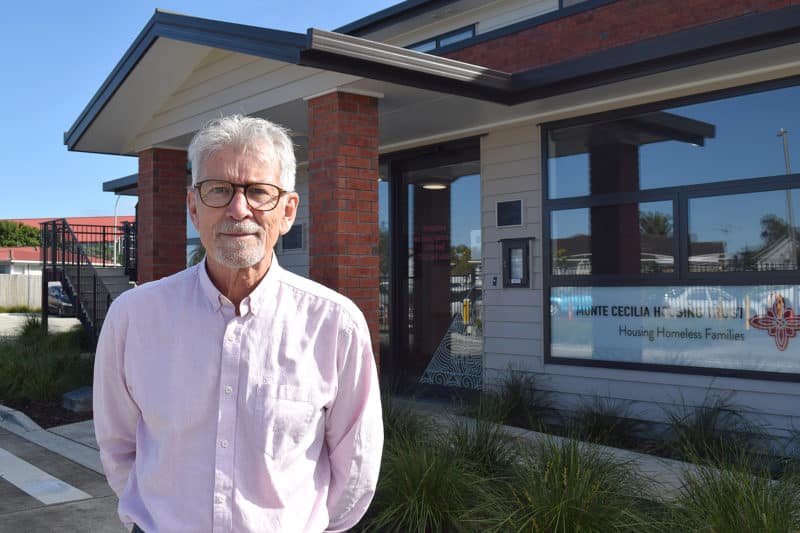Monte Cecilia Housing Trust chief executive Bernie Smith is stepping down from his role this month, leaving what was previously a $1.4 million operation with a budget this year of $30 million.
“We had three years where we’ve doubled in size every year. Not because we wanted to double in size, but because the housing and poverty need is increasing dramatically,” Mr Smith said.
Mr Smith started out with Monte Cecilia in 2016. Back then, the housing provider owned 30 properties. Today, they have 627 properties.
“There was never an intent to grow a bigger organisation. We’ve just grown to meet the demand,” he said.
Mr Smith said that he doesn’t like the word retirement. “Retirement isn’t in my DNA,” he said. “But I’m overdue for a long holiday.”
Mr Smith has been involved with the housing and homelessness sector for the past 14 years. Before Monte Cecilia, he worked for the Queensland government in the agency that dealt with homelessness.
“I’m a New Zealander involved in social services for quite a number of years. We went to Australia to do something different, and I ended up in homelessness (work),” he said with a laugh.
Upon moving back to New Zealand, he was shocked with the number of people sleeping rough or begging in the streets of Wellington.
“I came to Auckland and saw exactly the same thing. Then, I saw the advert for a CE for Monte Cecilia and I thought, well, here is an opportunity, with a team of people, to make a difference,” he said.
During his time at Monte Cecilia, he has spoken against various Government policies on housing and poverty.
“I’ve been a strong advocate in the media and that’s a very lonely role to be in. You come under a lot of criticism. Some people don’t understand why you’re so critical of government and policy. But when you see families, and particularly children, confronted with poverty and homelessness, somebody has got to be a voice for the voiceless,” he said.
He said that Government needs to “up its game in supporting homeless families”.
“When you compare across New Zealand that there’s 27,000 whanau on the waiting register, and. . . the rate the working poor is being made homeless, sometimes I wonder whether we’ve made a dent at all,” he said.
But, he said, when he sees the families they have helped who are now in a better situation, and have been able to buy their own houses, he knows they have made a difference.
“My hope and prayer is that that difference is actually generational. It’s not just the family today (that was helped), but that we’ve broken a cycle of homelessness and poverty,” he said.
Pandemic
Mr Smith said that the pandemic put additional pressure on an already constrained sector.
“[It was] probably one of the most difficult times for me as CE. One of the most difficult decisions I have had to make as CE is mandate staff to be vaccinated. And part of the reason for that mandating was we were in the epicentre of Covid back in 2020,” he said.
“A number of our staff live in multigenerational homes. And so, it wasn’t just about keeping staff safe, it was also about keeping the whānau that we work with safe as well.”
He lost three members of his staff who refused to be vaccinated. “That was difficult because you don’t like to lose staff. They become family,” he said.
Mr Smith said that he prefers to be a relational CE rather than a transactional CE. His pride in his staff is very obvious.
“We have some staff members with no housing skills that have been trained by us and have gone on to work for Kainga Ora. While that’s frustrating, I guess we can take the pleasure in training them,” he said.
He also told of a client who became a staff member.
“She went to WINZ for help because she was going to get contents insurance money, they wouldn’t help her. She was totally homeless, and that insurance pay-out was going to take some weeks if not months. Monte stepped in and provided temporary housing for her,” he said.
“Now she’s in a community house. She works for us. Her daughter is in medical school. And now she’s talking about buying her own house. Those are the stories that keep me on.”
Mr Smith said that the next CE will be surrounded with “a really good management team”. He said it’s time to review “what we’re doing, how we’re doing it and why we’re doing it”.
He said that a lot of the educational services being offered by Monte Cecilia — like financial literacy and IT literacy — can be taken to the community.
“Instead of being [at] the bottom of the cliff, let’s get to the top of the cliff, and empower whānau to make decisions towards self-sustainability sooner than later,” he said.
Mr Smith said that there are also opportunities to work more closely with the new Auckland Bishop Stephen Lowe.
“I met Bishop Steve and I’m really excited about his passion for whānau, and particularly those that are homeless and living in poverty,” he said.
Mr Smith said he expects that the new CE will come in with fresh eyes and energy, and will see things that he didn’t.
“I believe I can leave Monte with my hand on my heart and say I’ve done the best I could with the resources that I had at hand, and we’ve achieved some amazing things,” he said.

I am more or less homeless here as a single parent wy 3 kids its kind of hardship here pls i need a job and sponsorship any kind of legal job ,will so pls assist me .I Dont ask for money I need job to survive I wish to relocate with my kids